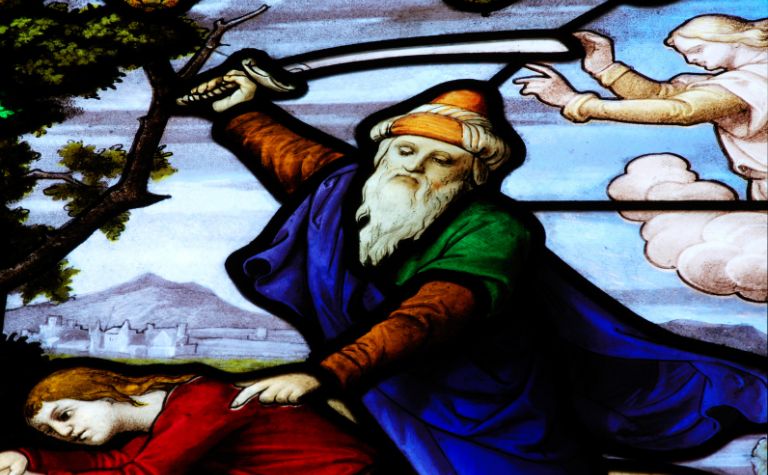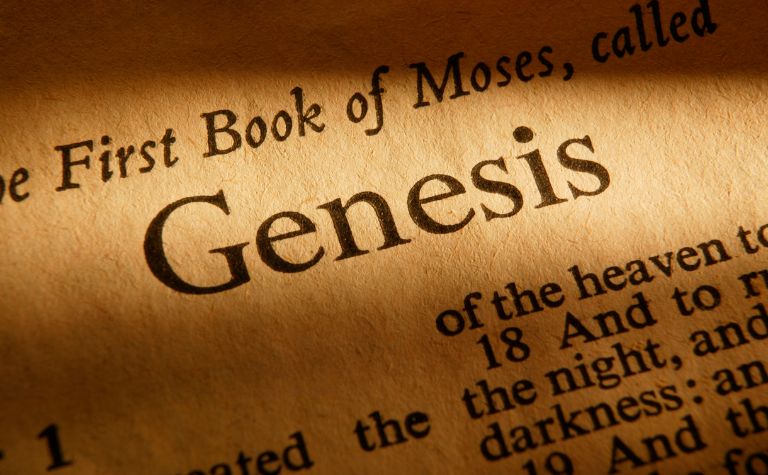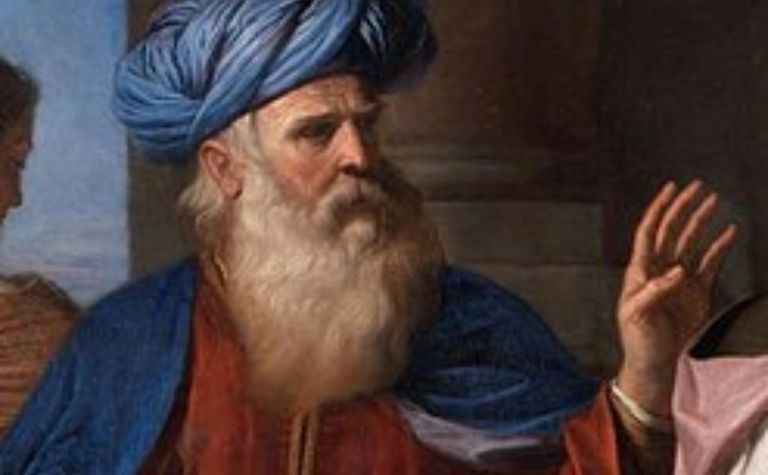Many people know Abraham for his faith in God (Rom. 4:1-5) and as the founding patriarch of the Jewish people (Gen. 12:1-3). While the book of Genesis tells his story, other writers in the Old and New Testaments also mention him. Bible readers are not only interested in knowing about Abraham’s life but also what Genesis says about his death.
Genesis reports that Abraham’s sons, Isaac and Ishmael, buried him inside a cave in a field, which he bought from a Hittite named Ephron. The field was east of Mamre, outside Hebron, south of Jerusalem, and west of the Dead Sea. Sarah’s body was also buried there.
How did Abraham die? Did Sarah die before or after him? What does “Machpelah” mean? Who else does Genesis say is buried in the cave? How far from Jerusalem was the burial site? What is Abraham’s legacy according to the Bible? Keep reading to learn the answers to these questions and others.
Also, Isaac’s birth was a key event in Abraham’s life. Learn Abraham’s age when Isaac was born to get more understanding.

The Death and Burial of Abraham
Genesis 25:1-18 records the death of Abraham and lists his descendants. The passage has similar characteristics to a modern-day obituary. After mentioning Abraham’s second wife, Keturah, and the sons he had with her (Gen. 25:1-8), the text states the patriarch was 175 when he died (Gen. 25:9).
The passage implies that Abraham died of old age: “Abraham breathed his last and died in a good old age, an old man and full of years, and was gathered to his people” (Gen. 25:10). Even though Abraham wasn’t perfect, which Genesis illustrates, his obituary-like description is a positive reflection of his life.
Isaac and Ishmael bury Abraham’s body
Genesis reports the exact location of Abraham’s burial place. It also states who buried him, how the family acquired the land from its original owners, and who else’s body rested in the same location.
The sons of Sarah and Hagar placed Abraham’s body in a cave. “Isaac and Ishmael his sons buried him in the cave of Machpelah” (Gen. 25:9a). Isaac was the son Abraham had with Sarah, his first wife. Ishmael was the son he had with Hagar, a household servant, at Sarah’s insistence because of her barrenness (Gen. 16).
After Ishmael was born, 13 years before Isaac’s birth (Gen. 17:25), tension permeated Abraham’s household because Hagar looked down upon Sarah because of her barrenness (Gen. 16:4). This led to Hagar and Ishmael’s exclusion from the household (Gen. 21:8-14).
However, when their father died, the half-brothers reunited to care for his body and give him an honorable burial. In the next generation, Isaac’s sons, Jacob and Esau, reunite to bury him (Gen. 35:29).
The Cave of Machpelah
The name “Machpelah” means “the double cave.” It signifies that the owner could use the cave as a burial plot for two people, which is what happens in Abraham’s story. Genesis 25:10 says, “There Abraham was buried, with Sarah his wife.” Sarah died before Abraham did, near Hebron, in Hittite territory (Gen. 23:1-2).
When Sarah died, the Hittites showed Arbaham respect, offering him a burial place for Sarah for free. They said, “Hear us, my lord; you are a prince of God among us. Bury your dead in the choicest of our tombs. None of us will withhold from you his tomb to hinder you from burying your dead” (Gen. 23:6).
Abraham insisted on paying the owner, Ephron, the son of Zohar, “the full price” for the cave of Machpelah. The passage describes the cave as “at the end of his field” (Gen. 23:9).
Also, Abraham’s grandson, Jacob, requested to be buried in the cave after dying (Gen. 49:29-30). His sons placed his body there according to his wishes.
Genesis 50:13 reads, “His sons carried him to the land of Canaan and buried him in the cave of the field at Machpelah, to the east of Mamre, which Abraham bought with the field from Ephron the Hittite to possess as a burying place.”
Also, names have special meanings in the Bible. Learn what the name Abraham means to understand more about his life.

Abraham Was Buried South of Jerusalem
Isaac and Ishmael placed Abraham’s body in a cave in a field the patriarch bought from a Hittite named Ephron, son of Zohar (Gen. 25:9b-10). The Bible only mentions Ephron the Hittite in the narrative of Abraham’s death (Gen. 23-25). However, “Ephron” is also the name of some mountains (Josh. 15:9) and a city (2 Chron. 13:19) in the Old Testament.
The region of Mamre
The field that contained the cave lay east of Mamre, outside Hebron, and south of Jerusalem. Named after an Amorite, “Mamre” means “grazing land.”
Earlier in Genesis, a man named Mamre helped Abraham defeat Chedorlaomer when he invaded the Promised Land and kidnapped Lot (Gen. 14:24). The place name Mamre may be named for him.
The area of Mamre was known for oak trees. Abraham had previously settled there after he separated from his nephew, Lot. “So Abram moved his tent and came and settled by the oaks of Mamre, which are at Hebron, and there he built an altar to the Lord” (Gen. 13:18).
The city of Hebron
Hebron was a city that lay in the elevated region of Judah, about 3,000 miles above sea level. It was 19 miles south of Jerusalem and 15 miles west of the Dead Sea.
Hebron is also mentioned in Old Testament stories about Moses (Num. 13:22) and David (2 Sam. 2:3). Readers shouldn’t confuse the town with individuals named Hebron (e.g., Exod. 6:18; Num. 3:19; 1 Chron. 2:42-43; 6:2, 18; 23:12).
Also, Sarah and Issac are important members of Abraham’s family. Discover who Abraham’s father was to learn more about his early life and calling.

What is Abraham’s Legacy?
Though the Bible mentions Abraham dozens of times in both testaments, he is the main character of Genesis 11:10-25:18. These chapters provide readers with an overview of the patriarch’s life, highlighting how God used him to advance his plan in the world, and eventually through the Israelite people.
Abraham was the forefather of the Jewish people
In many ways, Abraham’s legacy is connected to Isaac. God promised the patriarch he would give him a son from Sarah, but the couple doubted its fulfillment as they grew older.
Eventually, after decades of barrenness, Sarah gave birth to Isaac when she was 90 years old, and Abraham was 100 (Gen. 21). Abraham, through Isaac, not Ishmael or the sons he had with his second wife, Keturah, would father the nation of Israel (Gen. 17:21).
Abraham had great faith
The story that exemplifies Abraham’s faith in God is when he nearly sacrificed his son, Isaac. God told him to sacrifice Isaac as a test (Gen. 22:1). Though Abraham didn’t know it at the time, Isaac’s life was never in danger. An angel intervened when Abraham demonstrated that he was willing to obey God at any cost (Gen. 22:11-12).
The New Testament considers Abraham’s obedience a great act of faith. For example, Hebrews 11:7 reads, “By faith Abraham, when he was tested, offered up Isaac, and he who had received the promises was in the act of offering up his only son.”
Also, Genesis tells more about Isaac than Abraham’s other children. Discover why God asked Abraham to sacrifice his son for more insight into their lives.
References:
[1] Genesis 16-50 by Gordon Wenham. WBC.
[2] Holman Illustrated Bible Dictionary
Related Questions
The story of Noah, the flood, and the ark is one of the most iconic narratives in the Bible. Not only does the magnitude of the floodwaters leave readers awe-struck, but so does the faith that Noah...
Adam and Eve are the first humans God created. Readers know the pair as the first man and woman, and as the first people to rebel against God, which they did in the Garden of Eden. Did Adam and Eve...
